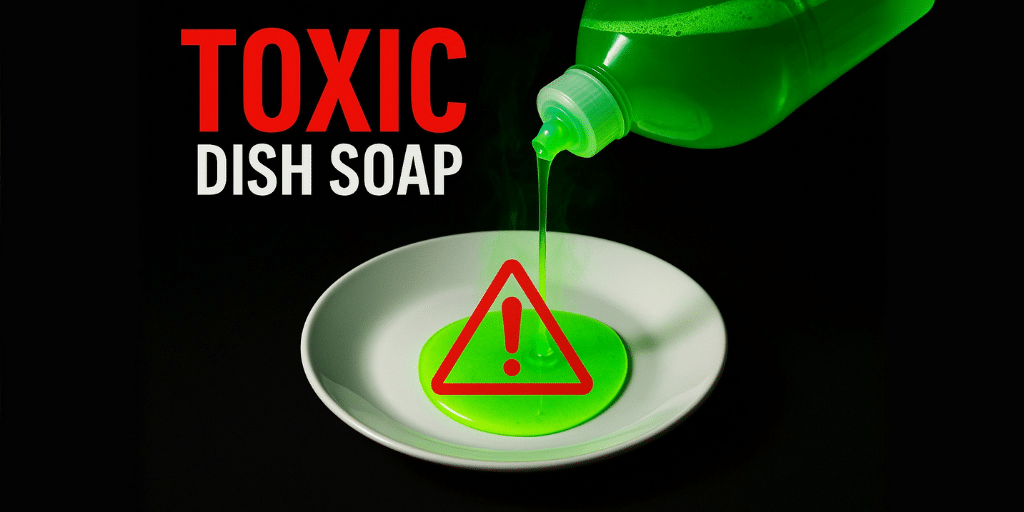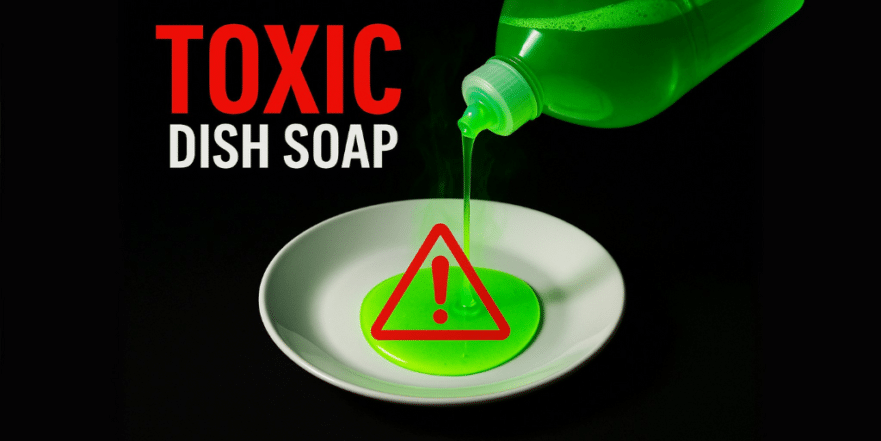
Have you ever opened a bottle of dish soap and noticed a smell that almost stings your nose? It turns out, that’s not just your imagination. Your body might be trying to tell you something. If it feels harsh just breathing it in, imagine what happens when tiny amounts of that soap coat your dishes and end up inside your body with every meal.
Think about it: your plate is like the launchpad for your food into your body. If that launchpad is covered in a thin film of chemicals, every bite you take can carry those toxins deeper inside. Most people assume dish soaps are harmless, just simple bubbles and foam. But there’s a hidden, toxic truth. Many common dish soaps are packed with synthetic fragrances, artificial colors, and chemical preservatives. These ingredients can release volatile organic compounds, or VOCs.
A study published in the journal Indoor Air highlighted that household cleaning products are a major source of indoor VOCs. These compounds can irritate your lungs, cause headaches, and even affect your nervous system. Ever felt a bit lightheaded while cleaning? It wasn’t just in your head; it was the chemistry interacting with your brain.
The Gut Reaction: How Dish Soap Affects Your Intestines
It doesn’t stop with your lungs and brain. A 2023 study in the Journal of Allergy and Clinical Immunology found that alcohol ethoxylates, which are common in detergents, can mess with your intestinal barrier and lead to inflammation. Even at the low concentrations that might remain on your dishes, these chemicals can cause problems.
Your gut lining acts like a coffee filter, letting good nutrients through while keeping toxins out. But with constant exposure to harsh chemicals from dish soap residue, tiny holes can form in this filter. Suddenly, things that should have been blocked can slip into your bloodstream, triggering immune responses and inflammation. It’s like spraying a window screen with harsh chemicals day after day – eventually, holes appear, and unwanted things get inside. That’s the long-term effect dish soap residues can have on your body.
Antibacterial Claims: Hype or Health Hazard?
Some dish soaps are labeled “antibacterial.” While that might sound like a good thing, research suggests otherwise. For years, many of these products contained triclosan, an antibacterial chemical that the FDA eventually banned from hand soaps in 2016. Why? Because it was linked to hormone disruption, antibiotic resistance, and damage to the environment.
A review in Environmental Science & Technology warned that triclosan can build up in the body, mess with thyroid hormones, and even affect fertility. Even without triclosan, other antibacterial additives can disrupt your body’s natural microbiome. It’s important to remember that not all bacteria are bad. Your gut relies on healthy bacteria for digestion, immunity, and even mood regulation.
When chemical antibacterials enter your daily routine, they don’t just attack germs on your plates; they can also upset the delicate balance of good bacteria within your body. And once these chemicals go down the drain, they don’t just disappear. They can persist in the environment, contributing to antibiotic resistance and harming aquatic life.
Natural Cleaning Power: Safer Alternatives
The good news is you don’t need harsh antibacterial chemicals in your dish soap. Regular soap and water are already effective at breaking down grease and physically lifting germs away. The FDA has stated there’s no proof that antibacterial dish soaps are any better than plain soap and water for everyday cleaning.
If you want extra assurance against germs, there are safe, natural ways to boost cleaning power without toxic side effects. White vinegar, for example, contains acetic acid. Research in Food Control showed that vinegar can effectively reduce microbial contamination on surfaces that come into contact with food. Lemon juice, with its natural citric acid, is another powerful antibacterial agent and deodorizer.
Baking soda mixed with hot water adds scrubbing power and helps eliminate odors. For surfaces like sponges or cutting boards, a 3% solution of hydrogen peroxide has been shown in studies to safely kill a wide range of bacteria and viruses. Essential oils like tea tree, thyme, oregano, and lavender contain natural compounds that are proven antimicrobials. Even adding a drop or two to a homemade soap mixture can provide antibacterial protection without the risks associated with chemicals like triclosan.
Key Takeaways
- Many conventional dish soaps release VOCs that can irritate lungs and affect the nervous system.
- Ingredients like alcohol ethoxylates can disrupt the intestinal barrier and cause inflammation.
- Antibacterial additives, even without triclosan, can harm your beneficial gut bacteria.
- Chemicals from dish soap can persist in the environment, contributing to pollution and antibiotic resistance.
- Natural alternatives like vinegar, lemon juice, baking soda, hydrogen peroxide, and essential oils offer safe cleaning power.
Simple Tests for Your Dish Soap
Let’s make this practical. Try this simple test: Wash a glass, rinse it well, and then fill it with plain water. Smell the water. If you can still detect a soapy fragrance, that means there’s residue left behind. And if you can smell it, you might be ingesting it.
Here’s another challenge: grab your dish soap bottle and read the ingredients list. If it looks like a complex science experiment with words you can’t pronounce, that’s a big clue that it might contain harsh chemicals.
Protecting Your Family
Most people don’t consider this, but that coffee mug you use every morning, the fork your children eat with, or the baby bottle you rinse – they might all be carrying tiny traces of these chemicals. Children, with their smaller and more sensitive systems, are particularly vulnerable. If dish soap residue can irritate an adult’s gut, imagine what it does to a child’s.
But here’s the good news: clean dishes don’t require harsh chemistry. There are safe, research-backed options available. Studies show that plant-based surfactants derived from sources like coconut or corn can clean effectively without leaving behind harmful residues. Think of it this way: you wouldn’t put toxic sludge in your car’s engine and expect it to run smoothly, right? Yet, many people are doing something similar to their bodies by using dish soaps with chemicals that can harm their lungs, gut, and brain.
Dish soap interacts with you in three ways: when you breathe it in, when it touches your skin, and when you ingest the residue left on your dishes. That’s why making a simple switch matters. Changing your dish soap might seem like a small step, but it’s one of those daily habits that adds up significantly over time. It’s not about living in fear; it’s about making smarter choices backed by science.
By swapping out just one bottle of conventional dish soap for a safer alternative, you can help protect your health, your family’s well-being, your gut, your lungs, and even the planet. The most powerful cleaner in your home isn’t what’s in the bottle; it’s your awareness. Now that you know the hidden truth about dish soap, you’ll likely never look at it the same way again. If this information opened your eyes, please share it with someone you care about, because we all deserve to know what might be hiding in our kitchens.
Source: Dr. Mandell

